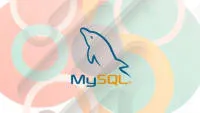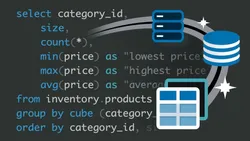
A beginner& guide to MySQL 
This guide provides an introduction to the basics of MySQL, helping beginners understand the fundamentals of this popular database management system. ▼
ADVERTISEMENT
Course Feature
![]() Cost:
Cost:
Free
![]() Provider:
Provider:
Udemy
![]() Certificate:
Certificate:
No Information
![]() Language:
Language:
English
Course Overview
❗The content presented here is sourced directly from Udemy platform. For comprehensive course details, including enrollment information, simply click on the 'Go to class' link on our website.
Updated in [April 29th, 2023]
Welcome to the beginner's guide to MySQL! This course will provide you with a comprehensive introduction to the world of MySQL, a powerful and popular open-source database management system. You will learn the basics of MySQL, including database CRUD operations, advanced query features such as GroupBy, and optimization techniques.
Course Overview: This course will provide you with a comprehensive overview of MySQL, from the basics of database CRUD operations to advanced query features and optimization techniques. You will learn how to create and manage databases, as well as how to use SQL to query and manipulate data.
Possible Development Directions: After completing this course, you will have a solid foundation in MySQL and be able to explore more advanced topics such as database replication, data warehousing, and database security. You will also be able to use MySQL to create web applications and integrate it with other technologies.
Related Learning Suggestions: To further your knowledge of MySQL, you may want to explore topics such as database design, database administration, and database performance tuning. You may also want to look into other database management systems such as PostgreSQL and MongoDB. Additionally, you may want to learn more about web development and web application frameworks such as Ruby on Rails and Django.
[Applications]
After completing this course, students should be able to apply their knowledge of MySQL to create databases, manipulate data, and optimize queries. They should also be able to use advanced query features such as GroupBy and other optimization techniques. Additionally, they should be able to use MySQL to create web applications and interact with other databases.
[Career Paths]
1. Database Administrator: Database Administrators are responsible for the installation, configuration, and maintenance of databases. They ensure that the databases are secure, reliable, and available to users. They also monitor performance and troubleshoot any issues that arise. With the increasing demand for data storage and analysis, Database Administrators are in high demand and the job outlook is expected to grow by 11% over the next decade.
2. Database Developer: Database Developers are responsible for designing, developing, and maintaining databases. They create database structures, write queries, and develop applications that interact with the databases. They also optimize databases for performance and scalability. With the increasing demand for data-driven applications, Database Developers are in high demand and the job outlook is expected to grow by 9% over the next decade.
3. Data Analyst: Data Analysts are responsible for analyzing data to identify trends and insights. They use data to inform decisions and develop strategies. They also create reports and visualizations to communicate their findings. With the increasing demand for data-driven insights, Data Analysts are in high demand and the job outlook is expected to grow by 16% over the next decade.
4. Data Scientist: Data Scientists are responsible for extracting, cleaning, and analyzing data to identify patterns and insights. They use data to develop predictive models and algorithms. They also create reports and visualizations to communicate their findings. With the increasing demand for data-driven insights, Data Scientists are in high demand and the job outlook is expected to grow by 19% over the next decade.
[Education Paths]
1. Bachelor's Degree in Computer Science: A Bachelor's Degree in Computer Science is a great way to gain a comprehensive understanding of the fundamentals of computer science, including programming, software engineering, and database management. This degree will provide students with the skills and knowledge necessary to develop and maintain databases using MySQL. Additionally, students will learn about the latest trends in database management, such as cloud computing and big data.
2. Master's Degree in Database Administration: A Master's Degree in Database Administration is a great way to gain a deeper understanding of database management and optimization. This degree will provide students with the skills and knowledge necessary to design, develop, and maintain databases using MySQL. Additionally, students will learn about the latest trends in database administration, such as data security and data warehousing.
3. Certificate in Database Management: A Certificate in Database Management is a great way to gain a basic understanding of database management and optimization. This certificate will provide students with the skills and knowledge necessary to design, develop, and maintain databases using MySQL. Additionally, students will learn about the latest trends in database management, such as data mining and data visualization.
4. Doctorate in Database Systems: A Doctorate in Database Systems is a great way to gain a comprehensive understanding of database systems and optimization. This degree will provide students with the skills and knowledge necessary to design, develop, and maintain databases using MySQL. Additionally, students will learn about the latest trends in database systems, such as artificial intelligence and machine learning.
Course Syllabus
MySQL
Insert
MySQL
MySQL Join
MySQL Aggregate
MySQL Views
MySQL GroupBy and SubQuery
MySQL Delete
Pros & Cons

Good for beginners to understand SQL.

Well explained.

Good for learning MySQL.

Can hear instructor.

Good for me.

Small amount of information.

Poor quality captions.

No certificate provided.

Not recommended.

Money not well spent.
Course Provider

Provider Udemy's Stats at AZClass
Discussion and Reviews
0.0 (Based on 0 reviews)
Explore Similar Online Courses

Positive Parenting After Separation

Splunk Enterprise Administration: Configuring Distributed Search

RDBMS PostgreSQL

Intro To PostgreSQL Databases With PgAdmin For Beginners

PostgreSQL: Client Applications

Mastering SQL using Postgresql

Database Design and Basic SQL in PostgreSQL

PostgreSQL: Advanced Queries

Spatial SQL with Postgres : A language for geographers

Learn SQL Using PostgreSQL: From Zero to Hero

PostgreSQL Essential Training

Harvard CS50's Introduction to Programming with Python : Full University Course
 Related Categories
Related Categories
 Popular Providers
Popular Providers
 Popular Searches
Popular Searches
Quiz
 Submitted Sucessfully
Submitted Sucessfully
1. What is MySQL?
2. What is the purpose of the GROUP BY clause in MySQL?
3. Which of the following is NOT a type of MySQL optimization?


Start your review of A beginner& guide to MySQL